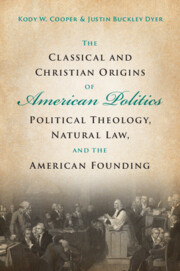 The Classical and Christian Origins of American Politics
The Classical and Christian Origins of American Politics Published online by Cambridge University Press: 22 December 2022
The pamphlets written during the great transatlantic debate spanning the 1760s and early 1770s are a window into the theoretical frame of the American mind in the years leading to the Declaration of Independence. The shared background assumptions of those pamphlets include the existence of a providential God whose governance of the world was an essential premise in their natural-law theories of morality and law. Most of the leading lights of the patriotic pamphleteers held their natural-law principles within a Christian frame, and the pamphlets they wrote in the 1760s and 1770s cast light on the ideas the colonists put forward, with one united voice, in the Declaration of Independence.This chapter highlights major contributors to the pamphlet debates, with particular attention given to two influential pamphleteers, James Otis and John Dickinson.
To save this book to your Kindle, first ensure no-reply@cambridge.org is added to your Approved Personal Document E-mail List under your Personal Document Settings on the Manage Your Content and Devices page of your Amazon account. Then enter the ‘name’ part of your Kindle email address below. Find out more about saving to your Kindle.
Note you can select to save to either the @free.kindle.com or @kindle.com variations. ‘@free.kindle.com’ emails are free but can only be saved to your device when it is connected to wi-fi. ‘@kindle.com’ emails can be delivered even when you are not connected to wi-fi, but note that service fees apply.
Find out more about the Kindle Personal Document Service.
To save content items to your account, please confirm that you agree to abide by our usage policies. If this is the first time you use this feature, you will be asked to authorise Cambridge Core to connect with your account. Find out more about saving content to Dropbox.
To save content items to your account, please confirm that you agree to abide by our usage policies. If this is the first time you use this feature, you will be asked to authorise Cambridge Core to connect with your account. Find out more about saving content to Google Drive.